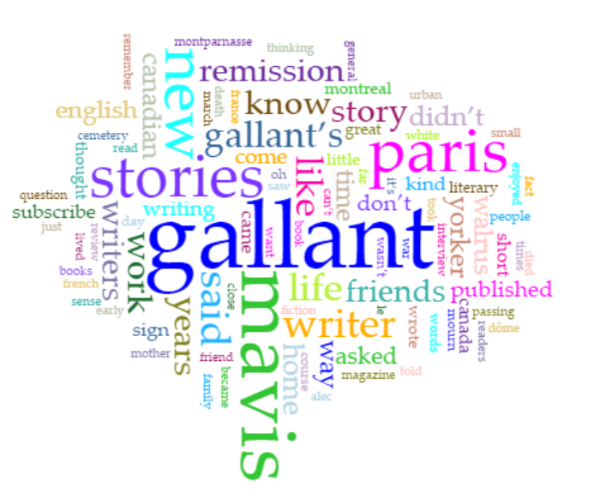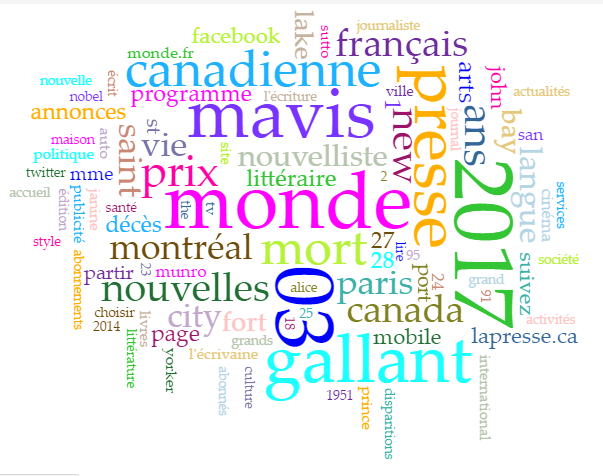Using Voyant, I created comparative word clouds of the French and English-language obituaries and profiles written in remembrance of Gallant. Out of the seven we read for class, the five obituaries written in English formed one word cloud while the two written in French formed the other. This disparity in sample size may have skewed the results toward a greater diversity of words reflected in the English word cloud. But I still uncovered some interesting results that suggest the differing ways in which Gallant is remembered by Francophone versus Anglophone publications.


Take the word French as an example. Français features prominently in the French word cloud, alongside Canadienne, Montreal, Canada, and Paris. In contrast, it is difficult to find the word “French” in the English word cloud; it is minuscule and tucked away to the left side of the word cloud.
In similar fashion, “Montreal” takes up barely more space on the English word cloud than the word “French”. Meanwhile, as was the case in the French word cloud, Paris, Canadian, English are still rather noticeable.
It may be that because Gallant never wrote her stories in French, she is perceived as more spatially rather than linguistically associated with France by Anglophone publications, which may explain why the word “French” barely registers on the English word cloud.
This spatial association may also explain why “Paris” is so much more prominent than “Montreal” on the English word cloud. Although there is a recognition of Gallant’s Canadian background, the fact that she lived in Paris during the latter part of her life up until her death may have imprinted a stronger connection between Gallant and Paris as opposed to Gallant and Montreal.
Beyond that, there is something to be said for specificity. That Gallant was associated with Canada but less so with Montreal in English language publications could speak to the Anglophone bias which unintentionally marginalizes French Canada.
To that point, Français and Canadienne are comparable sizes on the French word cloud, while Montreal and Paris similar in size with each other as well. It appears that the French-language publications are more judicious in their characterization of Gallant’s nationality and city of association. Gallant’s status as a world literature author seems to be more evident in the French-language publication write-ups than the English ones, judging from the comparative word clouds.
Obituaries and Profiles Used in Analysis:
- Sambuy, Livia M. “I’ve Lived Very Freely.” The Paris Review, 14 Mar. 2014.
- Verongos, Helen T. “Mavis Gallant, 91, Dies; Her Untold Stories of Uprooted Lives and Loss.” The New York Times, 18 Feb. 2014.
- Macfarlane, David. “Traces of Mavis.” The Walrus, 18 Mar. 2015.
- Savigneau, Josyane. “Mort de la nouvelliste canadienne Mavis Gallant.” Le Monde, 12 Feb. 2014.
- Ahearn, Victoria. “Décès de l’écrivaine canadienne Mavis Gallant.” La Presse, 18 Feb. 2014.
- Henighan, Stephen. “Remembering Mavis Gallant.” The Globe and Mail, 21 Feb. 2014.
- Hawtree, Christopher. “Mavis Gallant obituary.” The Guardian, 18 Feb. 2014.





